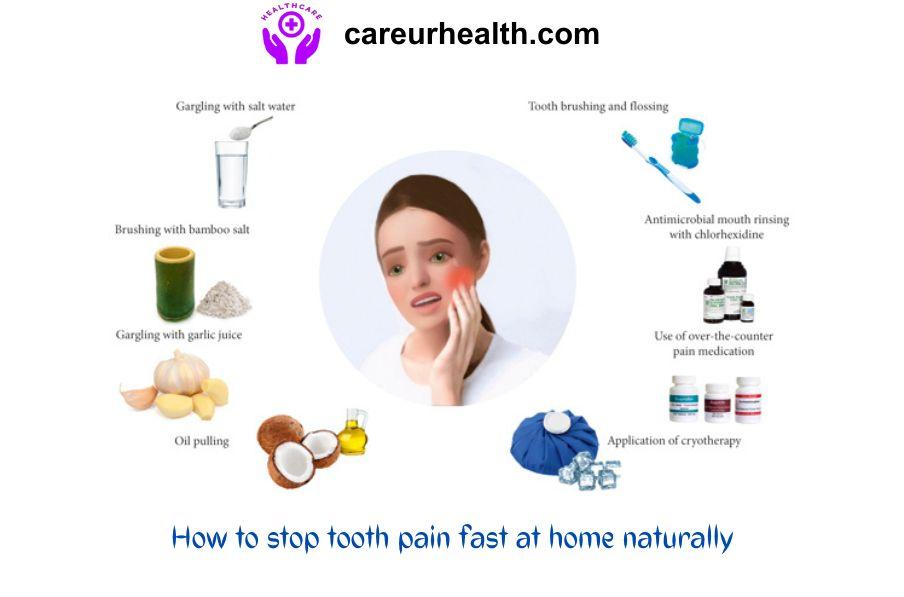How to stop tooth pain fast at home naturally. Tooth pain can be incredibly uncomfortable, often requiring immediate attention. While seeking professional dental care is paramount, there are natural remedies that can be administered at home to provide a measure of relief.
In this comprehensive guide, we will explore a range of effective techniques on how to stop tooth pain at home naturally. Ingredients that have been known to swiftly alleviate toothaches.
From time-tested practices to readily available household items, these natural remedies offer a valuable stopgap until professional dental treatment can be obtained.
“By incorporating these approaches into your oral care routine, you can find comfort and relief amid dental discomfort. And they can help to stop tooth pain by natural home remedies”.
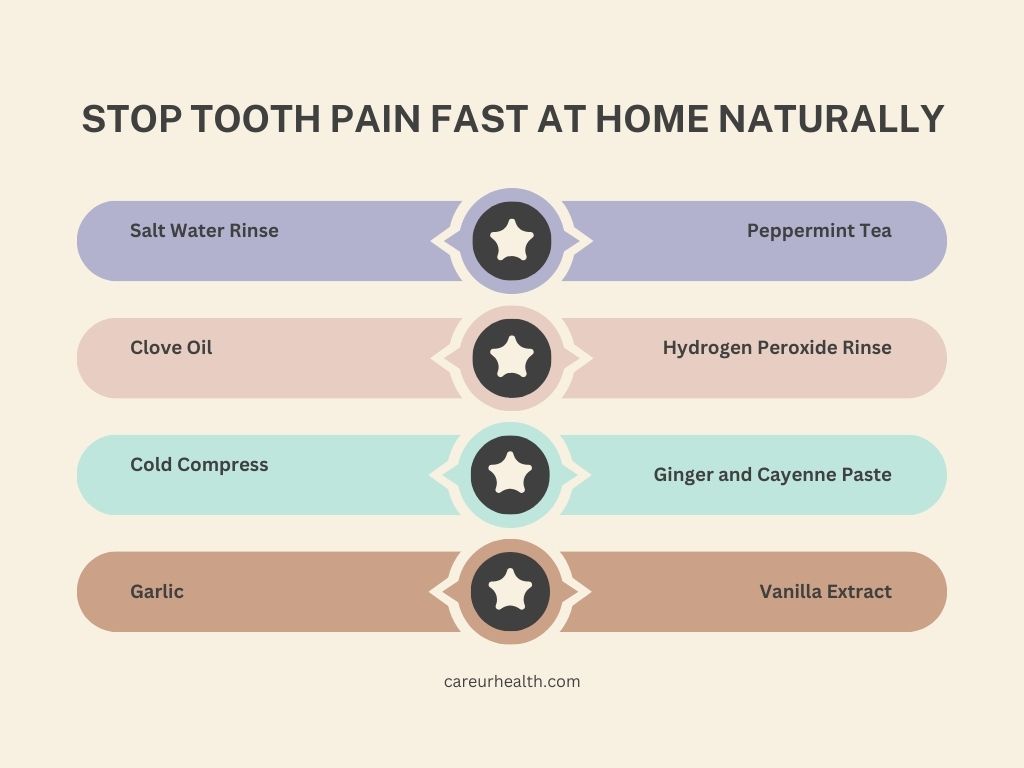
1. Salt Water Rinse

One of the simplest and most effective ways to temporarily alleviate tooth pain is with a saltwater rinse. It will help to stop tooth pain by home natural remedies. Salt has natural disinfectant properties that can help reduce inflammation and fight bacteria in the mouth.
How to Prepare and Use:
- Dissolve half a teaspoon of common table salt in a cup of warm water.
- Stir until the salt has completely dissolved.
- Swish a sip of the solution about your mouth for around 30 seconds to ensure it reaches the afflicted region.
- Spit out the solution.
Why it Works:
Saltwater works by changing the pH balance in your mouth, making it less favourable to the growth of dangerous germs. It also aids in the removal of fluids from swollen areas, lowering inflammation and offering pain relief.
When to Use:
A saltwater rinse can be used multiple times a day, especially after meals or whenever tooth pain flares up. It’s a safe and gentle remedy that can be incorporated into your oral care routine.
Caution:
Make cautious not to drink too much salt water, since it will dehydrate you. Furthermore, this cure is best utilized as a stopgap until you can seek expert dental care.
2. Clove Oil – best to stop tooth pain by this home remedy.
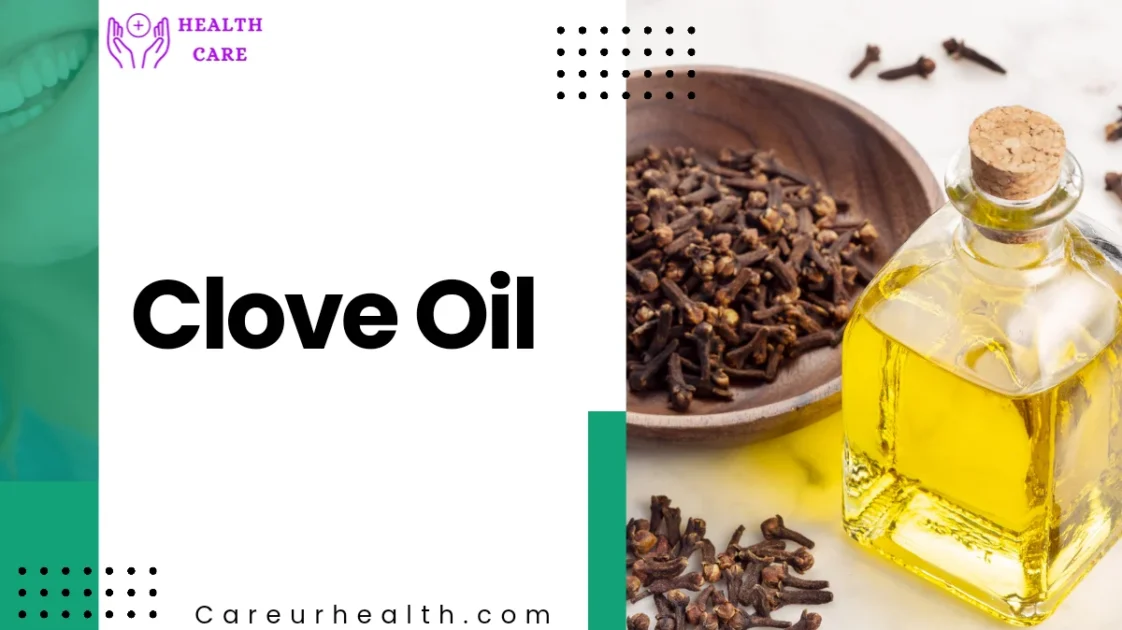
Clove oil is a natural analgesic and antiseptic that has been used for centuries to stop tooth pain by home remedy. It contains eugenol, a compound known for its pain-relieving properties. Applying a small amount of clove oil to the affected area can provide fast relief.
How to Apply Clove Oil:
- Begin by cleaning the affected area with a mild saline solution or a saltwater rinse.
- Dip a cotton swab or a clean piece of cotton into a small amount of clove oil, ensuring it is adequately soaked.
- Gently apply the oil directly to the affected tooth or gum area. Be cautious not to use excessive force to avoid further irritation.
The Power of Eugenol:
Clove oil owes its pain-relieving prowess to eugenol, a natural compound found in clove buds. So, it will stop the pain of tooth by this home remedy. Eugenol possesses both analgesic (pain-relieving) and anesthetic properties, making it an effective agent for numbing and providing relief from toothache.
Benefits of anti-inflammatory and antibacterial characteristics
In addition to analgesic benefits, clove oil has anti-inflammatory and antimicrobial properties. It can help reduce swelling and fight off oral bacteria, addressing the root causes of tooth pain.
Cautions and Considerations:
While clove oil is a valuable natural remedy, it should be used with care:
- Clove oil is quite potent and should be used with caution. A small amount goes a long way.
- Because clove oil can irritate the tongue, gums, and other sensitive oral tissues, it is crucial to prevent direct contact with them.
3. Cold Compress – home remedy to stop the pain of tooth

A cold compress can help reduce inflammation and numb the area, providing immediate relief from tooth pain. Pain of the tooth decreases by this home remedy. Apply it to the cheek near the affected tooth for 15 minutes at a time.
How to Prepare and Apply a Cold Compress:
- Begin by placing a handful of ice cubes in a clean, thin cloth or a plastic bag.
- Gently press the compress against the affected area of the face, adjacent to the painful tooth or gum.
- Hold the compress in place for approximately 15 minutes, ensuring it covers the area thoroughly.
The Science Behind Cold Compresses:
“Cold temperatures have a numbing effect on the nerves, which can significantly reduce pain sensation. Additionally, the application of cold helps constricts blood vessels, which in turn reduces inflammation and swelling in the affected area. Hence, decrease the pain of tooth by this home remedy”.
When to Use a Cold Compress:
A cold compress is particularly effective for acute situations, such as sudden and severe tooth pain, or in cases where the gums or face may be swollen due to dental issues. It is also beneficial after dental procedures to manage post-operative discomfort.
4. Garlic – home remedy to stop tooth pain
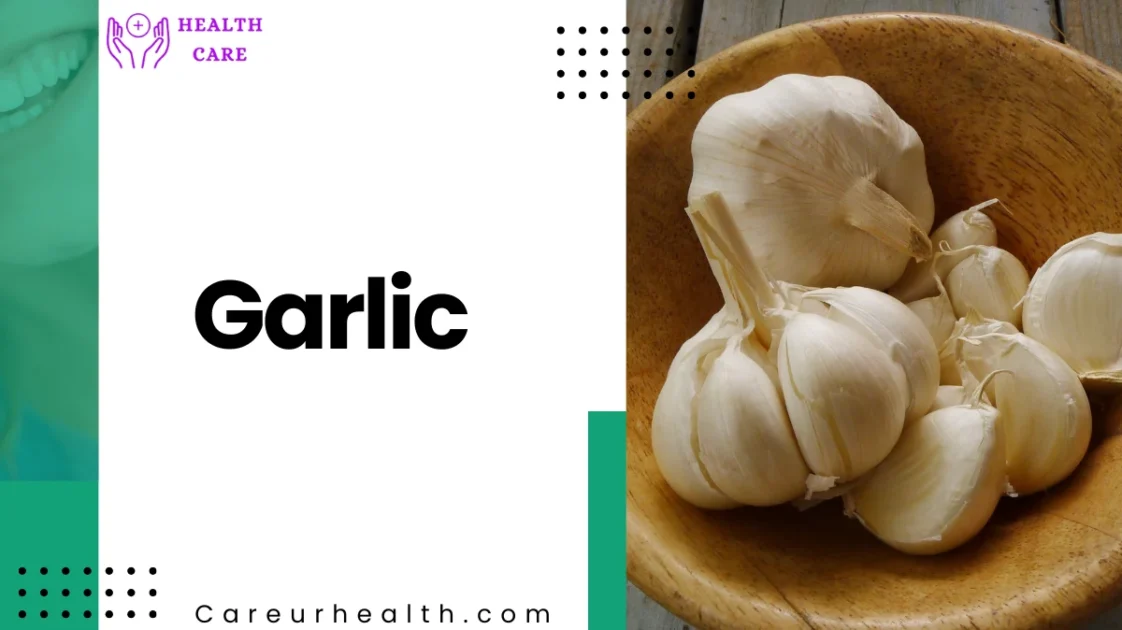
Garlic is a natural antibiotic with potent antimicrobial properties. Chewing on a clove of garlic or applying garlic paste to the affected tooth can help kill bacteria and reduce pain. It is known for its power to stop pain of tooth and also available in home easily.
How to Use Garlic for Tooth Pain:
- Begin by peeling a fresh garlic clove and washing it thoroughly.
- Crush the clove to release its active compounds. This can be done using the flat side of a knife or a garlic press.
- Apply the crushed garlic directly to the affected tooth or gum area.
- Leave it in place for about 10 minutes, ensuring it makes contact with the painful area.
The Magic of Allicin:
Garlic owes its medicinal properties to allicin, a bioactive compound released when garlic is crushed or chopped. Allicin is a potent natural antibiotic that can help combat oral bacteria and reduce inflammation.
Why Garlic Works for Tooth Pain:
Antibacterial Action: Garlic’s antimicrobial properties target the bacteria responsible for dental infections, helping to reduce inflammation and pain.
Garlic’s anti-inflammatory qualities can give relief from the swelling and pain associated with toothache.
Caution: While garlic is a potent natural medicine, it can be overpowering and induce tingling or burning sensations. Remove the garlic and rinse your mouth with water if you suffer discomfort.
5. Peppermint Tea – to stop the tooth pain, a home remedy.

Peppermint tea is a home remedy has numbing properties that stop pain from tooth.
How to Make and Drink Peppermint Tea:
- To begin, bring a cup of water to a boil.
- In a cup, place a peppermint tea bag or a handful of fresh peppermint leaves.
- Hot water should be poured over the tea bag or leaves.
- Allow it to steep for about 10 minutes, ensuring the tea becomes sufficiently concentrated.
- Let the tea cool to a comfortable temperature before using it.
The Power of Menthol:
“Peppermint contains menthol, a natural compound known for its cooling and numbing properties. This active ingredient is responsible for the soothing sensation that peppermint provides”.
Application for Tooth Pain:
Swishing a mouthful of cooled peppermint tea in the mouth can temporarily numb the affected area and provide relief from toothache. The menthol in the tea acts as a natural analgesic.
When to Use Peppermint Tea:
Peppermint tea is particularly effective for providing immediate relief from tooth pain due to its numbing effects. It can be used as often as needed to manage discomfort.
6. Hydrogen Peroxide Rinse

A hydrogen peroxide rinse can help kill bacteria and reduce inflammation. Mix equal parts of 3% hydrogen peroxide and water, swish it around in your mouth for 30 seconds, and then spit it out. After this home remedy, tooth pain would stop.
How to Make and Apply a Hydrogen Peroxide Rinse:
- To begin, dilute 3% hydrogen peroxide with equal parts water. This results in a safe oral concentration.
- Swish a little sip of the diluted solution in your mouth for 30 seconds to ensure it reaches the afflicted region.
- Spit out the solution. Do not swallow.
The Antimicrobial Action:
When hydrogen peroxide comes into touch with bacteria, it releases oxygen. This oxygenation process damages the microbes’ cell walls, essentially killing them. It is very efficient against anaerobic bacteria, which are frequent in oral infections.
When to Use a Hydrogen Peroxide Rinse:
A hydrogen peroxide rinse can be used as a supplemental oral hygiene practice. It is effective in reducing bacterial load, which can be beneficial in cases of tooth pain caused by bacterial infections. However, it is not a substitute for professional dental care.
Safety Considerations:
- While hydrogen peroxide is generally safe for oral use, it should be used with care:
- Always ensure it is properly diluted to a safe concentration (3% is standard for oral use).
- Avoid swallowing the solution, as it can irritate the digestive tract.
7. Ginger and Cayenne Paste
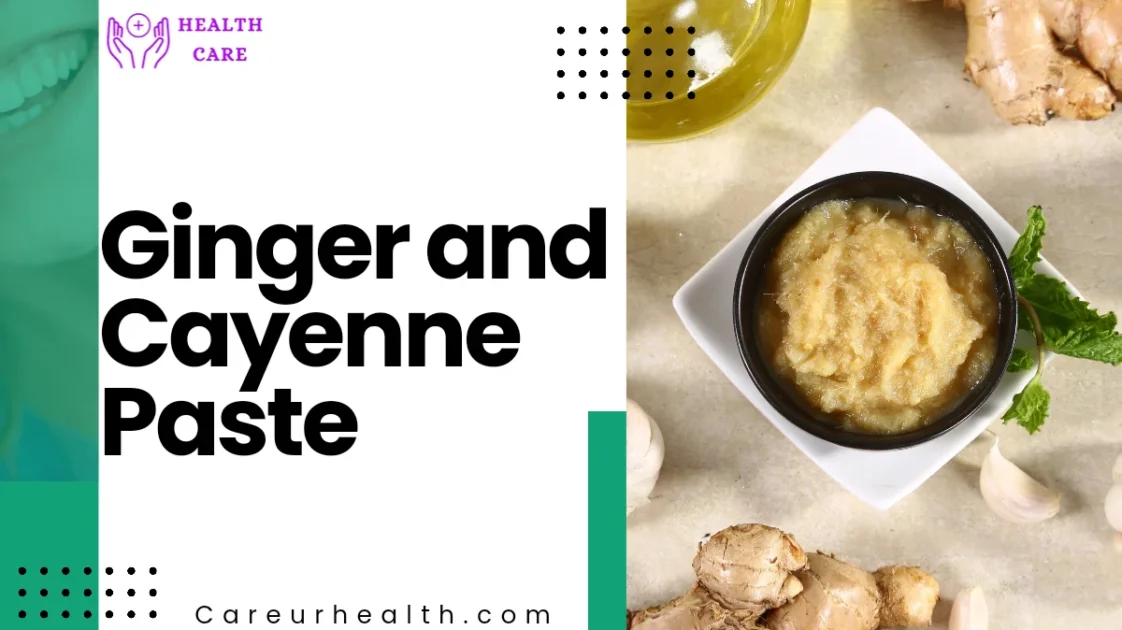
Both ginger and cayenne pepper contain compounds that can help alleviate pain. Hence, by this home remedy you get relief or tooth pain would be stop. Create a paste by mixing equal parts of ginger and cayenne with a small amount of water, then apply it to the affected tooth.
How to Prepare and Apply Ginger and Cayenne Paste:
- To make a tablespoon of grated ginger, peel and grate a fresh ginger root.
- Add a pinch of cayenne pepper to the grated ginger and combine to make a paste.
- Directly apply a tiny quantity of the paste to the impacted tooth or gum region. Be cautious not to use excessive force to avoid further irritation.
- Leave it in place for about 10 minutes, ensuring it makes contact with the painful area.
The Power of Capsaicin and Gingerol:
Cayenne pepper contains capsaicin, a natural compound known for its pain-relieving properties. It works by blocking pain signals from the nerves. Ginger, on the other hand, contains gingerol, which has anti-inflammatory and analgesic effects.
Why Ginger and Cayenne Paste Works for Tooth Pain:
Analgesic Action: The combination of capsaicin and gingerol creates a powerful analgesic effect that can provide fast relief from toothache.
“Anti-inflammatory Benefits: Both ingredients possess anti-inflammatory properties, which can help reduce swelling and discomfort associated with tooth pain”.
Cautions and Considerations:
It is typical for the paste to generate a warmth or tingling feeling. Remove the paste and rinse your mouth with water if you encounter any discomfort.
Use this paste sparingly and avoid contact with sensitive oral tissues.
Combining Ginger and Cayenne Paste with Other Remedies:
For enhanced effectiveness, consider combining this paste with other natural remedies like salt water rinses or clove oil applications. This holistic approach can provide comprehensive relief from tooth pain.
8. Vanilla Extract

Vanilla extract contains alcohol, which can help numb the area and provide temporary relief from pain. Apply a small amount to a cotton ball and hold it against the affected tooth. It will stop tooth pain by this home remedy.
How to Apply Vanilla Extract:
- Dip a cotton ball into a small amount of pure vanilla extract.
- Gently dab the cotton ball onto the affected tooth or gum area. Be cautious not to use excessive force to avoid further irritation.
- Leave it in place for about 10 minutes, allowing the vanilla extract to make contact with the painful area.
The Calming Effect of Vanillin:
Vanilla extract contains vanillin, a natural compound with mild analgesic properties. While not as potent as some other remedies, vanillin can offer a gentle numbing effect.
Why Vanilla Extract a home remedy Works for Tooth Pain or to stop the pain:
Mild Analgesic Action: Vanillin acts as a mild pain reliever, providing soothing relief from toothache.
“Familiarity and Comfort: The familiar scent and taste of vanilla can have a calming effect, providing a sense of comfort during times of dental discomfort”.
Considerations:
While vanilla extract is typically harmless, some people may be allergic to it. If you suffer any pain or allergies, stop using the product.
Read also pain relief Article:-
- How to Get Rid of Body Pain Naturally: A Comprehensive Guide
- How to Relieve Upper Stomach Pain with Home Remedies: A Comprehensive Guide
- Best exercise for joint pain
Conclusion:
While these natural remedies can provide fast relief from tooth pain, they are not substitutes for professional dental care. It’s important to consult a dentist for a proper diagnosis and treatment.
In the meantime, these home remedies can offer temporary relief and promote oral health. Thus home remedy is the best way to stop tooth pain.
FAQs related to How to stop tooth pain fast at home naturally
Q. Can I use these natural remedies if I am allergic to or sensitive to specific ingredients?
Proceed with caution if you have known allergies or sensitivities to any of the above compounds. Always do a patch test or see a healthcare practitioner before beginning any therapy, especially if you have allergies or intolerance.
Q. What causes tooth pain?
Tooth pain can be caused by various factors, including tooth decay, gum disease, tooth sensitivity, dental abscess, or injury.
Q. Is there a natural home remedy to stop tooth pain quickly?
Yes, several natural remedies like clove oil, salt water rinses, and cold compresses can provide temporary relief from tooth pain. Home remedies will help to stop tooth pain.
Q. How do I make a saltwater rinse?
Dissolve half a teaspoon of salt in 8 ounces of warm water. Gargle with the solution for 30 seconds, then spit it out.
Q. Is it safe to use a cold compress for tooth pain?
Yes, applying a cold compress to the affected area can help reduce swelling and alleviate pain.
Q. How often should I apply a cold compress for tooth pain?
Apply the cold compress for 15 minutes at a time, with breaks in between. Repeat as needed.
Q. What foods should I avoid when experiencing tooth pain?
Avoid extremely hot or cold foods, as well as foods that are hard, crunchy, or sticky, as they can exacerbate tooth sensitivity.
Q. Can I use herbal teas to help to stop with home remedies for tooth pain?
Yes, certain herbal teas like peppermint or chamomile can have soothing effects and help reduce discomfort.
Q. How does garlic help with tooth pain?
Garlic contains allicin, a natural antibacterial agent. Chewing on a piece of garlic can help reduce pain and kill bacteria.
Q. Can I use over-the-counter pain relievers for tooth pain?
Yes, over-the-counter pain relievers like ibuprofen or acetaminophen can help temporarily alleviate tooth pain. Follow recommended dosage instructions.
Q. Are there natural home remedies for tooth pain in children?
Natural home remedies can stop tooth pain like a cold compress, clove oil (diluted), or a saltwater rinse can also be used for children, but consult a paediatrician or dentist for specific advice.
Q. Should I see a dentist if the pain persists?
Yes, it is important to consult a dentist if the tooth pain persists for more than a day or if it is severe. It may be indicative of a more serious underlying issue.
Q. How can I prevent future tooth pain?
Maintain good oral hygiene by brushing and flossing regularly, visiting the dentist for check-ups, and avoiding sugary or acidic foods and drinks. Or use home remedy to stop tooth pain in future.
Q. How often can I use these natural home remedies to stop tooth pain?
The frequency of use depends on the specific remedy and your comfort level. To stop tooth pain by home remedies.
The above article is mirrored on how to stop tooth pain fast at home naturally.
Teeth Talk Girl







